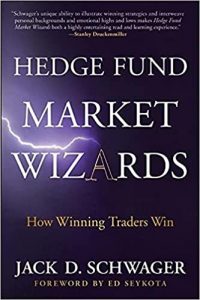Author Jack Schwager has written the greatest series of trading books in the industry by consistently getting interviews with the best traders of this generation. His book Hedge Fund Market Wizards is one of the best as it is comprised of interviews with professional traders with successful public track records. These money managers are able to both generate returns on capital and acquire and keep investment clients.
Hedge Fund Market Wizards review
Jack Schwager has written six must read trading books in his Market Wizard series. Amazingly, all of his books have meet the expectations of his readers because they give insights into the principles the best traders use to make money in the market.
Most traders I know read the original Market Wizard book at least once and many have read it multiple times. Schwager’s past books were a success at getting the world’s greatest traders with the best audited trading returns to grant an interview and then Schwager was able to ask the right questions and get them to open up and explain why they are so successful in the markets. Schwager is also a very talented editor able to condense his interviews and make them entertaining and educational for readers.
His Hedge Fund Market Wizard book is as good as all his others if not better. Jack Schwager was able to get the top hedge fund managers to explain how they were at the very top of their games. I had trouble putting this book down hanging on the words of these amazing traders. Reading this book for me as a trader was a great experience like reading classic trading literature. It’s both entertaining and educational.
After the over 400 plus trading books I have read I still consider Jack Schwagers Market Wizards Series the best of the best. Why? His trading books are not based on theories, opinions, predictions, or beliefs, he goes down a completely different path. His books are based on interviewing the very best traders in the world. These are the traders with the best returns year after year, the millionaires and billionaires. These traders make their living in the market.
The Hedge Fund Market Wizards book belongs right along side his others and gives the reader an up close look at how the world’s best hedge fund managers were able to find and master a trading style that fit their personality. Their edge allows them to beat the market and the vast majority of other hedge funds year after year. If you read this book carefully and pay attention you should find some trading principles that are powerful that could improve your trading dramatically. His books have improved my trading dramatically. Some trading books are like letting you see a trader’s trading plan, but Schwager’s books are like allowing the reader to see directly into the mind of the rich trader.
One hedge fund manager even made a call during his interview saying that Apple stock was an amazing buy and that it would sky rocket based on earnings projections over the next few years with the new iPad added to its arsenal of products and that Research in Motion stock would collapse with all the companies terrible missteps it was doomed. Since the interview in 2011 Apple went on to have one of the best performances in history and Research in Motion is almost out of business. That was pretty amazing to make a call like that in a Wizard book and it was one of the best calls that could have been made. But more importantly the book shows the reader how to to think like a great hedge fund manager and make your own trades.
Hedge Fund Market Wizards Summary
1. There Is No Holy Grail in Trading
There is no one way to trade that works all the time as markets are always changing. There are traders and investors that make money over time even with opposite strategies. Profitable trading comes from an edge and these hedge fund managers explain theirs. A big part of profitable trading comes from risk/reward ratios, a price action strategy with a positivity expectancy, and risk management.
2. Don’t Confuse the Concepts of Winning and Losing Trades with Good and Bad Trades
Good trades and bad trades are more a measure of a process than an outcome. Good trades can still lose money and bad trades can make money but over the long time good trade execution will make you money and bad trades that are just random gambling and trading too big can make you lose money.
3. The Road to Success Is Paved with Mistakes
A big factor that separates rich traders from unprofitable traders that failed is that the rich traders learned a lot of lessons from early mistakes. Unprofitable traders tend to just keep repeating the same mistakes over and over again. The ability to use self-discipline to stop repeating trading errors can be an edge in itself.
4. The Importance of Doing Nothing
Many great traders in this book explain the importance of doing nothing when there is nothing to do. This can be holding a winning position as it trends in your favor, staying in cash when the market is unfavorable to your strategy, or waiting to take you signal. Patience is an overlooked edge in the markets.
5. Volatility and Risk Are Not Synonymous
Low volatility charts and strategies doesn’t always imply low risk and high volatility charts and strategies doesn’t always imply high risk. Charts and strategies subject to random and variable large risks may show historical low volatility if a type of risk event isn’t present in the existing track record of a market or chart. Black Swan events can show up randomly in any market and managing risk through proper position sizing, stop losses, diversification, or hedges can cap downside risk in most strategies.
The strategy of selling out-of-the-money options can exhibit low volatility if there are no large, abrupt price moves, but is at risk of asymptotically increasing losses in the event of a sudden, steep selloff. Some traders can exhibit high volatility due to occasional large gains-not something most people worry about.
Strictly capped risk because of the asymmetric structure of trades can leave room for outsized gains that can look like risk in an equity curve but may not necessarily reflect downside risk. Some option strategies, like selling premium, can have both short-term low volatility over long time periods then sudden large drawdowns due to unhedged open-ended risk, while other strategies can have both high volatility and also contained risk.
Hedge fund Market Wizard quotes
“Traders focus almost entirely on where to enter a trade. In reality, the entry size is often more important than the entry price” ― Jack Schwager
“Buffett being penalized for underperforming versus managers riding the long side of the dot-com bubble is a perfect illustration of a common investor mistake—failing to realize that often the managers with the highest returns achieve those results because they’re taking the most risk, not because they have the greatest skill.” ― Jack Schwager
“Investors often make the mistake of equating manager performance in a given year with manager skill. In some instances, more skilled managers will underperform because they refuse to participate in market bubbles. In fact, during market bubbles, the best performers are often the most imprudent rather than the most skilled managers.” ― Jack Schwager
“Relationships. For example, if the S&P was moving in an inverse lockstep to the bonds, and bonds were down for the day, but the S&P was not responding on the upside, it would tell me I should sell the S&P.” ― Jack Schwager
“Big market price changes happen when lots of people are forced to reevaluate their prejudices, not necessarily when the world actually changes.” — Colm O’Shea”
“I have what I call my Evel Knievel screen. These are companies that are trying to jump the Grand Canyon and probably won’t make it. There are only two conditions for the screen. First, the company is trading at more than five times book value. Second, the company is losing money. My job is to figure out which stocks won’t make it across the Grand Canyon and then go short those stocks.” ― Jack Schwager
“You can use charts to give you a plus or minus toward your view, but you can never start with the chart.” ― Jack Schwager
Hedge fund Market Wizards list of interviews
Chapter 1. Colm O’Shea : Knowing when it’s raining
Chapter 2. Ray Dalio : The man who loves mistakes
Chapter 3. Larry Benedict : Beyond three strikes
Chapter 4. Scott Ramsey : Low-risk futures trader
Chapter 5. Jaffray Woodriff : The third way
Chapter 6. Edward Thorp : The innovator
Chapter 7. Jamie Mai : Seeking asymmetry
Chapter 8. Michael Platt : The art of science of risk control
Chapter 9. Steve Clark : Do more of what works
Chapter 10. Martin Taylor : The Tsar has no clothes
Chapter 11. Tom Claugus : A change of plans
Chapter 12. Joe Vidich : Harvesting losses
Chapter 13. Kevin Daly : Who is Warren Buffett?
Chapter 14. Jimmy Balodimas : Stepping in front of freight trains
Chapter 15. Joel Greenblatt : The magic formula
Conclusion : 40 Market Wizard Lessons.
I would put the Hedge Fund Market Wizard book on my top ten must read trading books of all time.

